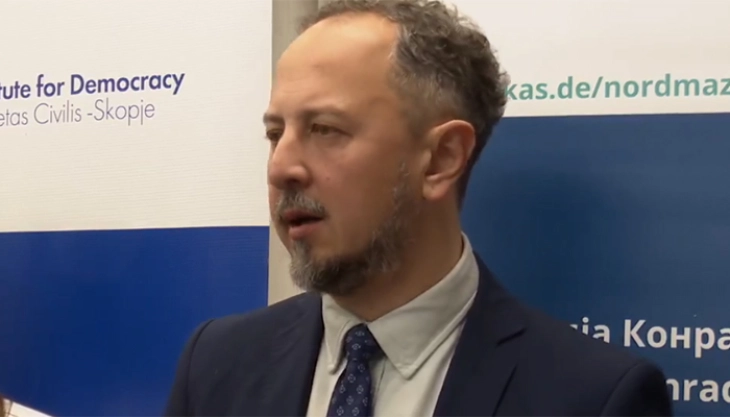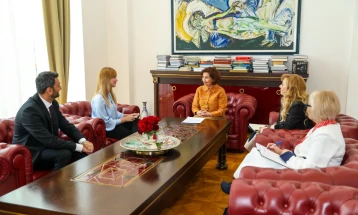Troshanovski: There is great resistance to constitutional amendments, proactive approach needed
- Only 20% of respondents support constitutional amendments as a requirement to start negotiations with the EU, shows a public opinion survey conducted between October and December 2024 by the Institute for Democracy “Societas Civilis” Skopje (IDSCS) in cooperation with the Konrad Adenauer Foundation (KAS) to examine public opinion on current issues related to the European integration process.

Skopje, 17 February 2025 (MIA) – Only 20% of respondents support constitutional amendments as a requirement to start negotiations with the EU, shows a public opinion survey conducted between October and December 2024 by the Institute for Democracy “Societas Civilis” Skopje (IDSCS) in cooperation with the Konrad Adenauer Foundation (KAS) to examine public opinion on current issues related to the European integration process.
"The remaining of the respondents are divided between: status quo, withdrawing from the process and changing the Negotiating Framework. It is interesting to note that citizens do not see the process so much as satisfying the demands of the neighbours, but rather see a certain reforming and democratic value of the process, i.e. they see the process more as aligning with the standards and laws of the European Union," Anamarija Velinovska, researcher at the IDSCS Centre for EU integration, said ahead of the presentation of the public opinion analysis paper.
IDSCS head Marko Troshanovski said "there is great resistance to constitutional amendments as a requirement for starting negotiations". He believes that the state should take a proactive approach in the process.
"We should also know that opposing them at all costs and repeating the injustice that has been inflicted on us cannot bring us much good, especially at this harsh geopolitical time when everyone looks after their own interests," said Troshanovski.
Giving a political commentary on the findings, he said – “we must work dedicatedly towards finding solutions” and “demand modalities from the European Union that will guarantee us a more objective and predictable negotiation process”.
"Without demanding changes to the Negotiating Framework or insisting that we will not be conditioned in the future, but rather demanding greater credibility of the process, that is the path we should move towards as a country. So, a proactive approach should be taken," Troshanovski said.
Asked whether he supports constitutional amendments with delayed effect, he said "they do not help us gain objectivity and predictability in the process."
According to him, predictability should be sought in European standards, the implementation of Friendship Treaty with Bulgaria, especially the work of the history commission which, he noted, "is now left hanging in the air, working without a methodology and at the will of the Bulgarian side, in an asymmetrical relationship."
"If the process is now European and if the entire EU stands behind it, it should be guided by European standards and that is what we should focus on and seek as a state, primarily. Secondarily, but no less important, is also in terms of the Roadmap for the Rule of Law, i.e. the plan for the protection of minority rights that will constantly be part of the negotiations with the EU, we need to clean it from possibly malicious interventions that will claim that Macedonia has hate speech or systemic discrimination based on some vague criteria, such as, for example, the part on hate speech in a private space as stated in the treaty with Bulgaria, which is outside all standards and definitions of hate speech," said the IDSCS head.
He stressed that "we need to focus as much as possible on protecting and objectifying the process" because, he noted, it is also in the interest of the European Union.
"Because without such a protected process, bilateral issues, not only between Macedonia and Bulgaria, but also between all other aspiring countries, candidate countries and current member states, all the bilateral issues will come to the surface and will again block the enlargement which, we now see, more than ever, is a very important moment and a necessity of the new reality for Europe, especially in the global geopolitical context, as well," Troshanovski said.
Photo: print screen







